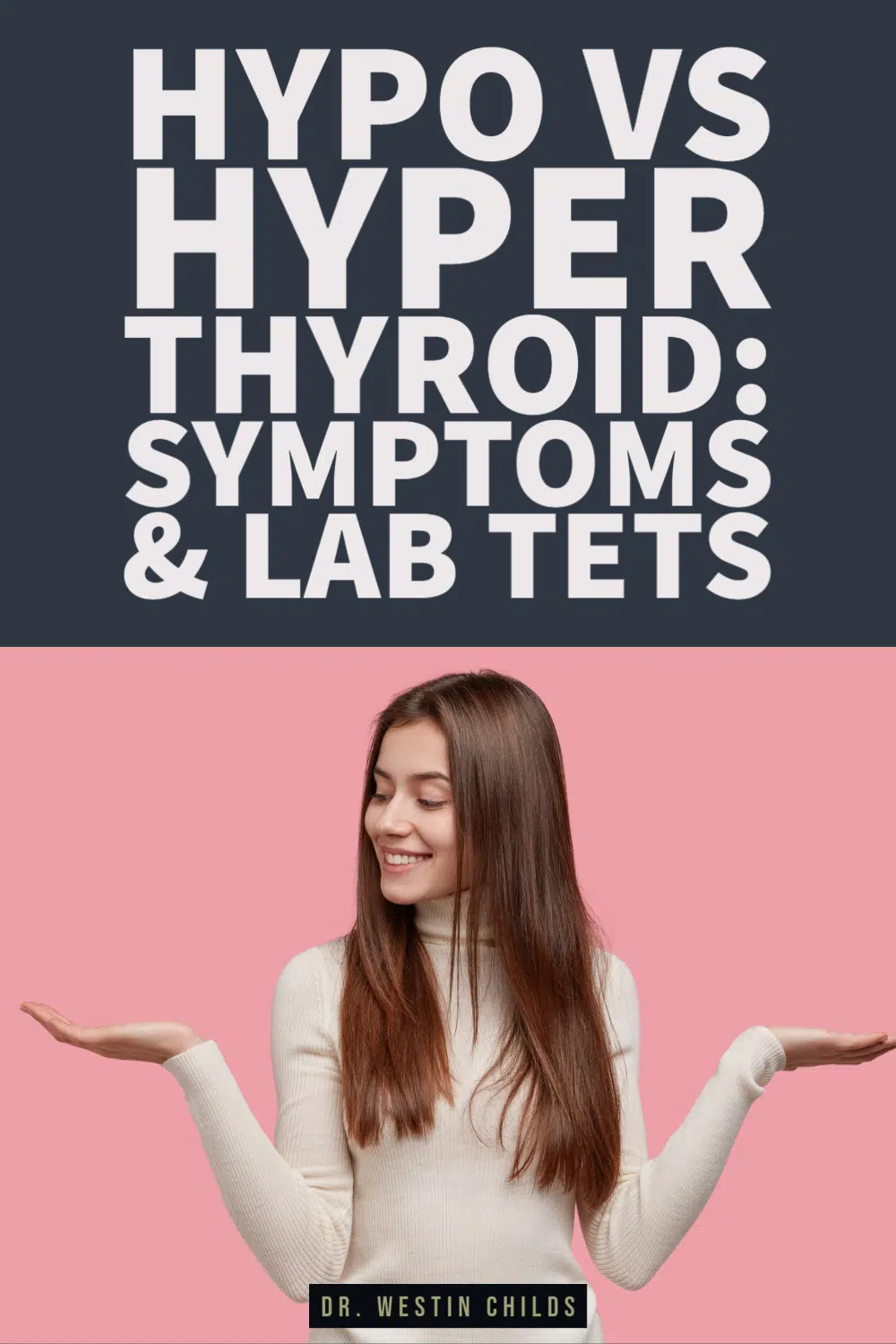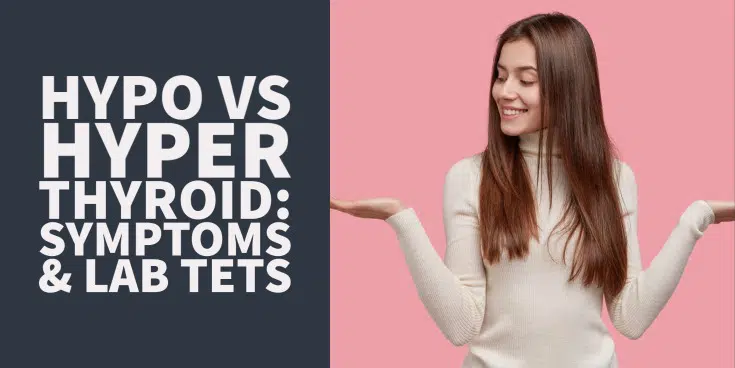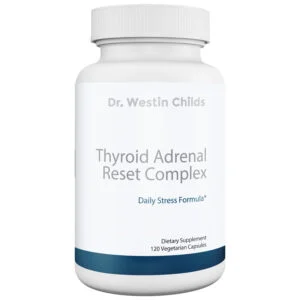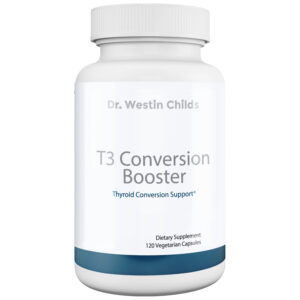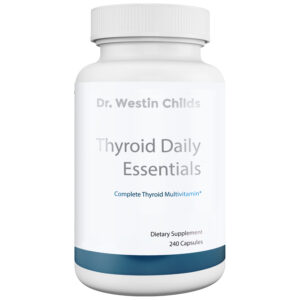This post will help you understand the primary differences between the two opposite thyroid conditions known as hypothyroidism and hyperthyroidism.
You will also learn the symptoms associated with each medical condition and how they alter your thyroid lab tests.
Let’s jump in:
Thyroid Dysfunction Basics
Your thyroid gland may be one of the most important glands in your body.
This has to do with the impact that thyroid hormone has on almost every cell in your body.
Thyroid hormone is produced from the thyroid gland, under the direction of your brain (both the pituitary and hypothalamus).
The regulation of thyroid hormone production and conversion is tightly regulated at many levels.
From the production of prohormones in your brain to the management of thyroid conversion at the cellular level, all steps are regulated by important feedback loops.

And for good reason:
Thyroid hormone helps regulate important functions such as your metabolism (1), body heat production (2), heart rate, cholesterol (3), and energy production in your cells.
Even slight dysfunction in this complex system causes big symptoms in patients.
So how does the thyroid become dysregulated?
We can break it down into two main categories:
#1. Hypothyroidism is the lack of production of thyroid hormone from the thyroid gland
#2. And Hyperthyroidism is the excessive production of thyroid hormone from the thyroid gland
You can think of these conditions as polar opposites of one another.
They are caused by different conditions and result in dramatically different symptoms (though there is some overlap in general symptoms between both conditions which we will discuss).
These conditions can be separated from one another with simple lab tests and also through clinical symptoms.
With up to 2-10% of ALL people suffering from thyroid disease in some form (4), it’s very important to understand the differences between these conditions.
DOWNLOAD FREE RESOURCES
Foods to Avoid if you Have Thyroid Problems:
I’ve found that these 10 foods cause the most problems for thyroid patients. Learn which foods you should avoid if you have thyroid disease of any type.
The Complete List of Thyroid Lab tests:
The list includes optimal ranges, normal ranges, and the complete list of tests you need to diagnose and manage thyroid disease correctly!
Hypothyroidism Symptoms & Lab Tests
The most common thyroid condition (between hypothyroidism and hyperthyroidism) is known as Hypothyroidism.
As stated hypothyroidism is the name of the condition in which there is insufficient circulating thyroid hormone in the body.
Many different conditions can cause this disease state (which we will discuss below) but what is important is how it presents clinically (meaning your symptoms) and the changes that it creates in your lab tests.
Even though many diseases cause this condition, they all tend to have the same symptoms and present with similar labs.
One of the easiest ways to differentiate between thyroid conditions is with lab testing.
What Happens to Thyroid Lab Tests if you have Hypothyroidism?
- TSH (Thyroid-stimulating hormone) – In hypothyroidism, the TSH tends to be elevated. There is debate among physicians on what constitutes a normal vs optimal TSH, but it’s helpful to consider that healthy adults tend to have a TSH around 1.0 – 2.0. A TSH greater than 5.0, is associated with hypothyroid symptoms and is usually sufficient to diagnose hypothyroidism.
- Free T3 & Free T4 – Free T3 represents the free thyroid hormones in your bloodstream, in hypothyroidism, these values tend to be normal to low.
- Thyroid Antibodies – The presence of thyroid antibodies may indicate the presence of an autoimmune disease as the cause of your thyroid issue. Some conditions that cause hypothyroidism may be autoimmune in origin (such as Hashimoto’s thyroiditis) but you can have hypothyroidism with normal or negative thyroid antibodies as well.
Hypothyroidism Symptoms Checklist:
Low thyroid function (otherwise known as hypothyroidism) tends to cause a slowing down of all important functions in the body.
This slowing down results in decreased energy production, a slower than normal metabolism, a lower than normal appetite, and so on.
The symptoms associated with these changes include:
- Fatigue or low energy
- Weight gain (usually mild)
- Cold intolerance (inability to stand cold temperatures)
- Hair loss, dry skin, or cracked and brittle nails
- Constipation or slowing down of your GI tract
- Pain in the joints and muscles
- Depression, brain fog, or a reduction in mental clarity
- Lower than normal heart rate and body temperature
Examples of Conditions that cause Hypothyroidism:
Many different conditions can cause hypothyroidism including medications, autoimmune diseases, and even medical procedures.
I’ve put together the most common causes below:
- Hashimoto’s Thyroiditis (5) (Autoimmune disease)
- Pituitary or Hypothalamic damage/tumors (6)
- History of Thyroidectomy (7) or Radioactive iodine ablation (both conditions result in thyroid gland damage/removal)
- Nutrient deficiencies (like Iodine, zinc (8), or selenium)
- Excessive intake of goitrogenic foods and substances
- Radiation to the head/neck or exposure to radiation without thyroid protection
- Certain prescription medications (9) (beta-blockers, diabetic medications, anti-seizure medications)
- Congenital issues which cause a lack of development of the thyroid gland (rare)
- Pregnancy (increases demand on the thyroid)
Hyperthyroidism Symptoms & Lab Tests
Hyperthyroidism is the EXACT opposite when compared to hypothyroidism.
This makes the diagnosis and distinguishing the two diseases relatively simple.
For example:
If hypothyroidism causes weight gain then hyperthyroidism causes weight loss.
If hypothyroidism causes a slow heart rate then hyperthyroidism causes a rapid heart rate and palpitations.
If hypothyroidism causes constipation then hyperthyroidism causes diarrhea.
These opposites tend to hold true for most symptoms, but there is some overlap in symptoms such as hair loss and fatigue.
Both hypothyroidism and hyperthyroidism can lead to these non-specific symptoms as well.

The good news is that, even if there is some overlap, you can distinguish between the conditions based on other symptoms and lab tests.
What Happens to Thyroid Lab Tests if you have Hyperthyroidism?
Hyperthyroidism is often caused by EXCESSIVE or INCREASED release and production of thyroid hormones in the body.
This release of thyroid hormone is easy to check and identify in the blood serum and usually presents as follows…
- TSH – The TSH is usually suppressed or VERY low in hyperthyroid patients. If a normal TSH is around 1.0 then a hyperthyroid patient may have a TSH of around 0.1 or less (10).
- Free T3 & Free T4 – In hyperthyroid patients, free T3 is often elevated while free T4 may be normal or low.
- Thyroid Antibodies – The most common cause of hyperthyroidism is the autoimmune Graves’ disease which may present with thyroid antibodies known as thyroid-stimulating immunoglobulin. But, like hypothyroidism, you can have hyperthyroidism without elevated antibodies as well.
Hyperthyroid Symptoms Checklist:
- Heat intolerance (inability to tolerate warm temperatures)
- Weight loss or an increase in appetite
- Rapid heart rate or heart palpitations
- Anxiety or jittery sensation
- Insomnia
- Diarrhea
- Hair loss or dry cracked brittle hair (some overlap between hypothyroidism)
- Fatigue or low energy (some overlap between hypothyroidism)
Examples of Conditions that Cause Hyperthyroidism:
- Graves’ disease (11)
- Toxic multinodular goiter (12) (goiters that produce thyroid hormone outside of regular feedback loops)
- Excessive thyroid medication or dose (taking too much thyroid hormone medication)
- Thyroiditis (usually temporary)
- Certain tumors that produce thyroid hormones or TSH (13) (very rare)
It’s important to realize that the treatment for hyperthyroidism is to reduce the amount of thyroid hormone being produced by the thyroid gland.
This often results in procedures to either remove or destroy the thyroid gland.
Once the thyroid gland is removed or destroyed then patients may become hypothyroid.
This can be confusing for some patients at first but it makes sense once you sit and think about it.
FAQ
Still, have some questions about the difference between hypothyroidism and hyperthyroidism?
Check out this frequently asked question guide which may give you further insight.
Can you have Hyperthyroidism and Hypothyroidism At the Same Time?
It’s impossible to have both the symptoms of hyperthyroidism and hypothyroidism at the same time.
The symptoms depend on the degree of thyroid hormones in your bloodstream, so if they are high they can’t possibly be low at the same time.
But just because they don’t occur at the same time doesn’t mean that someone can’t have both conditions.
What do I mean?
Some conditions, such as Hashimoto’s thyroiditis (and other causes of thyroiditis) can cause temporary bouts of hypothyroidism followed by bouts of hyperthyroidism.
These symptoms are caused by the inflammation in the thyroid gland which can occasionally “force” out excessive thyroid hormone (causing hyperthyroidism) and it can damage the gland over time leading to decreased thyroid hormone production (causing the symptoms of hypothyroidism).
So someone can alternate between these two conditions and have disease states that cause them both, but they can NOT experience both at the same time.
What gets confusing, especially for patients, is that there is some overlap between the symptoms of hypothyroidism and hyperthyroidism.
In addition, other medical conditions and medications (especially thyroid hormone) can make the picture confusing.
For instance:
Someone who has a diagnosis of hypothyroidism can take excessive thyroid medication which leads to hyperthyroid symptoms such as heart palpitations and shortness of breath.
This person doesn’t have both conditions at the same time, instead, they are experiencing negative side effects of the treatment for their condition.
You can almost always differentiate hyperthyroid symptoms from hypothyroid symptoms by looking at your metabolic function.
If your heart rate is slower than normal, if your metabolism is sluggish, if your energy is low then you are most likely suffering from hypothyroidism.
If, on the other hand, your heart rate is elevated, your metabolism is high and you are feeling “jittery” then you are most likely suffering from hyperthyroidism.
You can also get lab tests to confirm the diagnosis (discussed above).
What is the difference between Hashimoto’s and Hypothyroidism?
Hashimoto’s thyroiditis is a medical condition that CAUSES hypothyroidism in patients.
The important part to understand is that not all cases of hypothyroidism are caused by Hashimoto’s.
Hashimoto’s thyroiditis is an autoimmune condition that causes damage to the thyroid gland.
In the early stages of the disease patients may actually suffer from hyperthyroid symptoms due to this damage.
But long-term most patients will experience thyroid gland damage which results in decreased thyroid hormone production and the symptoms of hypothyroidism.
Is Hypothyroidism more common than Hyperthyroidism?
Hypothyroidism occurs in around 0.5 – 1.9% of women and less than 1% in men (14).
Subclinical hypothyroidism occurs in anywhere from 3.0 – 13.6% of women and 1.0 – 5.7% of men.
The older you are (and if you are female) the more likely you are to develop hypothyroidism in your life.
Hyperthyroidism occurs in around 1.0 to 1.4% of women (15).
When you put these numbers together you will find that hypothyroidism is more common than hyperthyroidism.
Hypothyroidism is even more common when you consider that the treatment for hyperthyroidism often results in hypothyroid symptoms!
So, if you have hyperthyroidism and you undergo treatment, then you will most likely need thyroid hormone medication which puts you into the “hypothyroid” group.
Is One worse Than the Other?
These two conditions can’t really be compared to one another in this way.
Conditions that cause hypothyroidism are more likely to be sinister and more difficult to diagnose which may lead to symptoms such as slow weight gain, depression, fatigue, and so on.
On the other hand, hyperthyroidism causes enough symptoms to lead a patient to the doctor’s office to get treatment more rapidly due to heart palpitations, increased sweating, and so on.
From a quality of life standpoint, hypothyroidism may be the more difficult to manage condition, whereas hyperthyroidism may cause more immediate problems.
Is Graves’ disease Hyperthyroidism or Hypothyroidism?
Graves’ disease is an autoimmune condition that causes hyperthyroidism.
But, not all cases of hyperthyroidism are caused by Graves’ disease!
In this way, you can think of Graves’ disease and Hashimoto’s on opposite ends of the spectrum as it relates to your thyroid.
Hashimoto’s is an autoimmune disease that often leads to hypothyroidism while Graves’ disease is an autoimmune disease that leads to hyperthyroidism.
Conclusion
Hypothyroidism and hyperthyroidism are both serious medical conditions that may dramatically impact and alter your quality of life.
If you suspect you have either condition you should report to your doctor and get tested with the complete thyroid lab panel.
This panel, along with a physical exam and personal history, should be sufficient to help diagnose your condition.
Treatment depends on which condition you are suffering from but may range anywhere from the use of thyroid hormone medications (for hypothyroidism) to medications designed to slow down your thyroid (for hyperthyroidism).
Now I want to hear from you:
Are you suffering from the symptoms of hypothyroidism or hyperthyroidism?
Are you having trouble differentiating which conditions you have?
Have you been able to find more understanding by looking at your lab tests?
Leave your comments and symptoms below!
